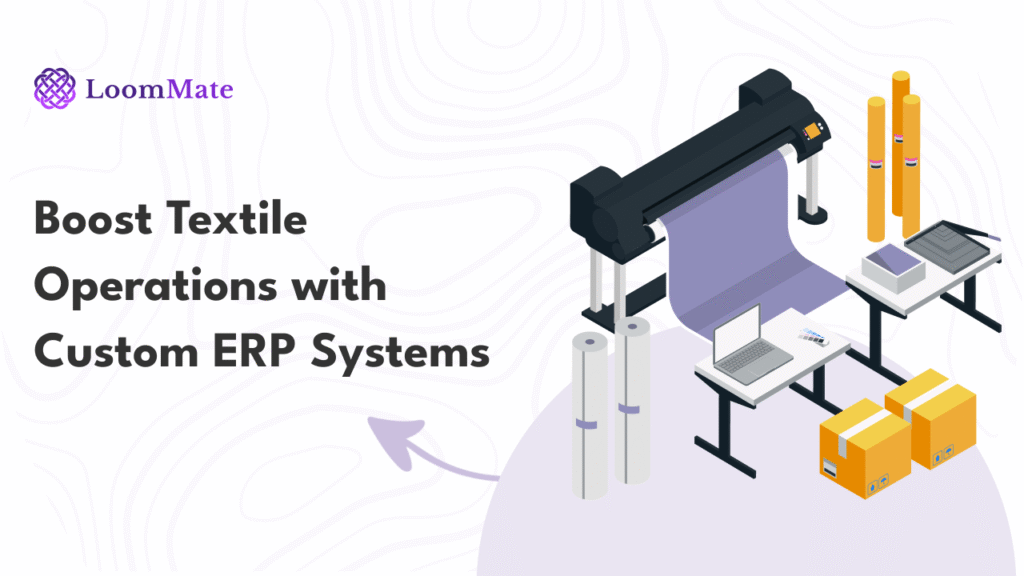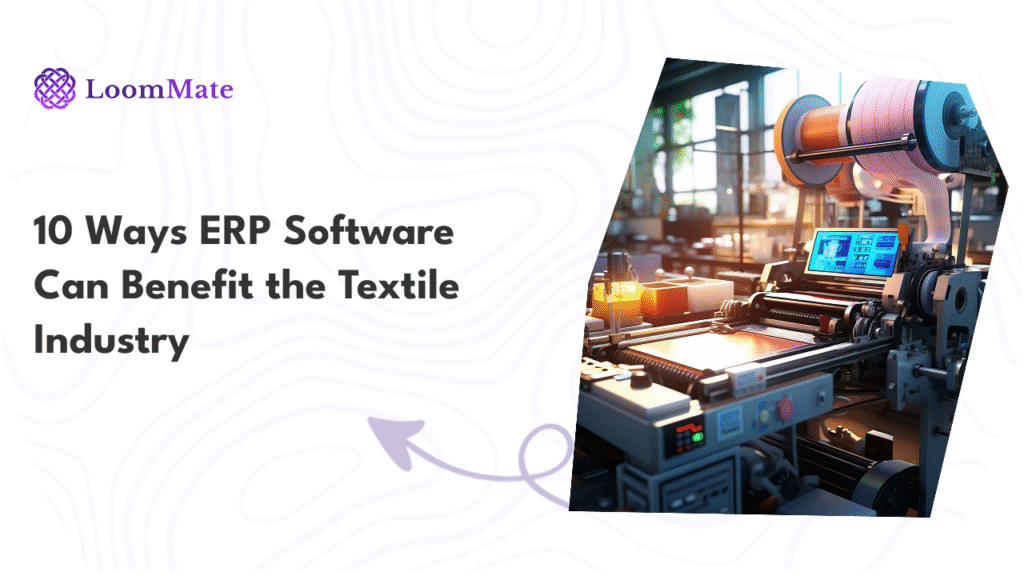Introduction
To stay successful in today’s textile sector, efficiency, precision, and seamless communication among departments are required. Manufacturing mistakes, inventory variations and departmental miscommunication are problems numerous textile companies deal with. Outdated software or disconnected systems tend to be the source of these issues. Using a custom ERP system is one of the best strategies to boost productivity and optimize textile operations. From production and inventory management to sales and finance an ERP system integrates all vital company activities into a single unified solution created for the specific needs of the textile sector.
Why Textile Businesses Need ERP
The complicated processes including fiber sourcing, spinning, weaving, dying, finishing, quality assurance, and shipping are a component of the textile industry. Errors and inefficiencies can occur from performing these tasks with files or independently software. An ERP system provides an integrated system for continuous oversight and oversight of all operations. This facilitates decision-making based on data, increases accuracy, and improves interaction.
An ERP system, for example, enables a production manager to confirm raw material availability immediately, schedule operate based on machine capacity, and track the status of orders without needing to wait for email updates or printed reports. Superior service delivery is guaranteed by sales staff having knowledge of real-time inventory and the customer order status data.
What is a Custom ERP System?
A customized ERP system is software designed to specifically address the operational requirements of a given business or sector. Custom ERP systems are created with the company’s departments, workflows, and processes in mind, as compared to off-the-shelf ERP solutions which offer general abilities. They are also perfect for sectors like textiles which have particular requirements.
Different companies in the textile industry have different needs based on their business strategy (e.g., make-to-stock, make-to-order) and product category (e.g., clothing, home textiles, industrial fabrics). These distinctions may not be successfully defended by an approach that fits all. This is an instance when custom ERP software is helpful.
Benefits of ERP Custom Software in Textile Industry
Here are some key advantages of using ERP custom software in textile operations:
1. Real-Time Production Monitoring
Real-time tracking of all production stages is possible with ERP systems. Its dyeing, weaving, or stitching equipment current state is always visible to managers. It makes it easier to recognize delays early and address problems prior to them getting out of hand.
2. Efficient Inventory Management
Textile enterprises manage a wide variety of raw materials and finished products. Effective forecasting of demand, batch tracking, and stock level management are all made easier with an ERP system. Stock outs and overproduction decrease as a result.
3. Improved Quality Control
Modules for recording inspections findings, fault analysis, and customer feedback may be included in a custom ERP. Tracking quality trends over time helps in continual growth.
4. Streamlined Order Management
ERP systems can automate and analyze each step, from making an order to the final delivery. A single location is able to manage pricing terms, delivery times, and customer-specific preferences.
5. Integrated Financial Accounting
ERP systems combine sales, purchases, payroll, and expense tracking, hence eliminating the need for separate accounting software. Better financial transparency and compliance are therefore assured.
6. Scalability
A custom ERP system can be upgraded with extra functions or improved as the textile sector grows. As a result, it is a long-term investment that may be modified according to changing company needs.
Case Example: How LoomMate Helps Textile Manufacturers
One of the top suppliers of ERP solutions that have a textile focus, LoomMate is mindful of specific challenges faced by this industry. Specifically intended for textile operations, the application provides abilities such as automated invoicing, work card production, fiber monitoring, and full reporting.
A textile company may use LoomMate ERP to handle inventory, maintain an eye on production batches, and minimize waste—all via a single dashboard. The customized ERP system may be customized to meet the needs of clothing factories, spinning mills, weaving facilities, and dye houses. After setting up, users have reported significant cost savings, reduced manual errors, and quicker order processing.
Custom ERP System vs Generic ERP Software
Due to their decreased starting costs, generic ERP systems are first implemented by numerous businesses. Generic systems, however, frequently need extensive customization, which increases costs and grows longer the time required for use. A custom ERP system, on the other hand, is made form the bottom up according to the unique demands of the company, which makes simpler to put into effect and eventually more effective.
In the textile sector, even small delays in manufacturing or incorrect material planning may give rise to missed dates and financial losses. Therefore, it is far more affordable to make an investment in a specialize ERP system that is aware of the textile workflow.
Choosing the Best Custom ERP Software for Textile
When choosing the best custom ERP software for your textile firm, take the following features in mind:
- Industry-Specific Modules: Verify that the ERP has processes for finishing, printing, weaving, passing away, and the like.
- User-Friendly Interface: Both technical and non-technical workers should find the application easy to use.
- Customization Capabilities: When the business develops, you’re going to be able to add or change features.
- Integration Support: It should be able to work with current hardware or software, such as measuring equipment and bar code scanners.
- Data Security: It is essential to protect sensitive financial and production data.
- Reporting Tools: Planning and performance tracking are aided by connected data for finance, sales, and production.
Implementation Tips for ERP Custom Software
Planning and coordination are required while implementing custom ERP software. Here are a few suggestions to help it succeed:
- Involve All Departments: During layout, collect feedback from accounts, sales, production, and stores.
- Train Your Team: Make certain that every user received the training they need for using the software effectively.
- Start Small: Begin using only a handful of components before working from there up.
- Choose the Right Vendor: Establish together with ERP businesses that are proficient in textiles processes.
- Monitor Progress: After implementation, evaluate performance and make any changes that are needed.
Conclusion
Businesses in the textile sector work in a competitive environment that has tight earnings and strict deadlines for delivery. Utilizing broken technologies or handling procedures by hand could result in waste and inefficiency. Production, inventory, sales, finance, and customer administration can all be handled on one platform by an efficient ERP system.
Textile companies may manage their very own processes with freedom by investing in a custom ERP system. Companies can boost customer satisfaction and efficiency through robotics, real-time tracking, and accurate data. Companies such as LoomMate offer solutions customized to the textile industry that are built from the bottom up to meet the specific needs of textile operations. The best custom ERP software is a vital starting point if you intend to optimize your operations and expand in an environmentally friendly way.
FAQs
1. What is a Custom ERP System?
Custom ERP software is specifically designed according to the operational requirements of a certain business, as opposed to generic ERP software with standard features.
2. Why is ERP important in the textile industry?
The ERP systems unify textile companies in managing complex operations such as production, inventory, or order tracking, thereby becoming more efficient.
3. What are the benefits of using ERP custom software?
The custom ERP will provide real-time data, better inventory management, production tracking, quality control, and the ability to make decisions more quickly.
4. How is a Custom ERP System different from generic ERP software?
Custom ERP is tailored specifically to fit your business needs; therefore, it is better suited and more flexible. Generic ERP might need to be customized further to be used at all.
5. How long does it take to implement a Custom ERP System?
Depending on company size and scope, it may take from a few weeks to a few months, including time for planning, setup, and training.



